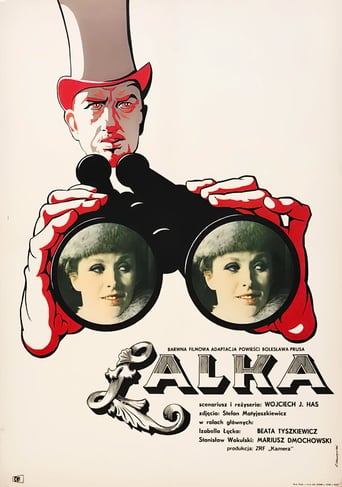allenrogerj
...according to the hero of this film, Wokulski, and the film reflects his view. Sumptuously, beautifully, formally it depicts a people trapped and betrayed by themselves. Wokulski, who fought in a rebellion against the Russian occupiers and went to Siberia for it, made his fortune supplying the Russian army fighting Turkey. The film shows his abilities- his business acumen, his skill in finding potential profit, his deep friendships, his generosity and freedom from prejudice- but all are made vain by his obsessive love of Izabella, the selfish and snobbish daughter of a stupid and bankrupt aristocrat. Wokulski realises the stupidity of his obsession at the end- Izabella might even realise her own contemptibility- but his madness and what he abandons for it probably destroys him. This might sound misogynistic, but it isn't; other women are shown to be intelligent, sympathetic and every bit as trapped as the men. Even Izabella is in some ways the victim of Wokulski's ideals and demand for qualities in her that she cannot have. The film is superbly shot and put together. From the shop of Wokulski and his partner Rzecki which sells trinkets to the aristocrats and the wealthy we can see a square full of beggars and gypsies and homeless people and there are long tracking shots through the streets of the city following characters- Wokulski and a prostitute he helps, Wokulski and an inventor he abandons because of his obsession with Izabella- who only meet in a hovel at the end of their journey. There are elements of magic realism too- the inventor is working on a lighter-than-air metal; when we first see Wokulski he is a waiter in a bar who has made an unsuccessful perpetual motion machine- symbolically a group of young men try to pull away the ladder from the cellar and stop him climbing out- and there are several shots of women deliberately depicted as motionless dolls trapped in the audience's gaze. There are also wonderfully funny scenes- the nobleman Wokuski fights a duel with who is entirely dependent on his Jeevesian valet, the taciturn jockey who wins a race for Wokulski- but finally the film shows a trapped and futile set of people- aristocrats with no function but snobbery, patriots with no nation but antisemitism- and Wokulski himself, a hero of his time and place, which stops him fulfilling his potential. Unhurried, deliberate, elegant as the aristocrats it portrays, The Doll is a social comedy and a human tragedy.
Fredericmignard
Wojciech Has is probably one of the most mesmerizing directors ever. He's one of these rare directors who manage to make the viewers forget their accounts just by depicting the most beautiful scenes.Unfortunately he has grown out of fashion and has sadly been forgotten by everyone. Unfair. And yet, his films are among the wealthiest filmic pieces of art. They are built with words and pictures. They are a literary works with words borrowed from the books the Polish director adapted. They are obviously visual with loaded and ornate shots full of incredible details which are reminiscent of gothic art and surrealism.THe Doll is more linear and more accessible than most of Has's movies, but it's in no way a betrayal of what he has done before. Has manages to make this conventional piece of literature a film coherent to his work as he included his dearest themes among which the theme of travel, spiritual and of course physical travels and the morbid theme of decay here through the slow agony of the aristocracy.This is of course a must-see film, a genuine masterpiece. Its two and a half hour length shouldn't repel you. And if you like this touching and gruesome trip, get ready for his next film, The Sand-Glass, simply his best film and the most incredible spiritual journey you'll ever have in your life.




